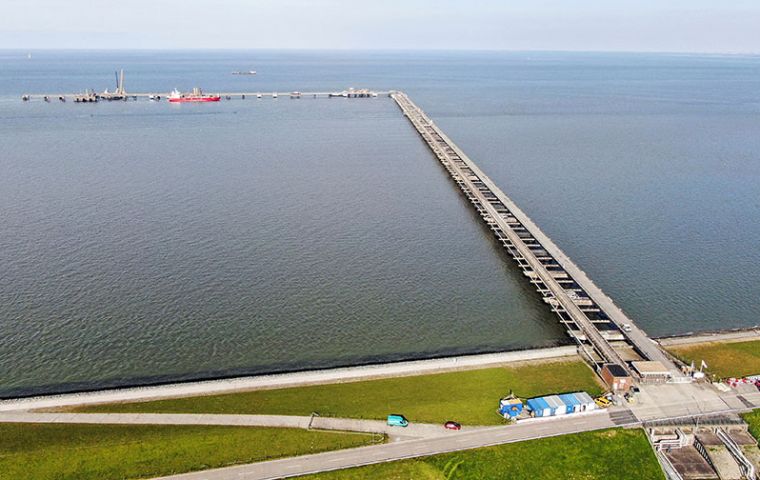MercoPress. South Atlantic News Agency
Germany fast-track building its first LNG terminal, operational by end of year
 Construction of the LNG import terminal has been fast-tracked, with German Economics Minister Robert Habeck hoping to complete this at “Tesla speed”
Construction of the LNG import terminal has been fast-tracked, with German Economics Minister Robert Habeck hoping to complete this at “Tesla speed” Germany has begun construction on its first LNG import terminal, and in the meantime, has rented four mobile floating tankers as it scrambles to rid itself of the need for Russian natural gas, reports Charles Kennedy from oilprice.com
Construction of the LNG import terminal has been fast-tracked, with German Economics Minister Robert Habeck hoping to complete this at “Tesla speed”, in less than a year.
The terminal is being built in Wilhelmshaven on the German North Sea, and officials are aiming to see the first LNG tankers dock at it by the end of this year. Additional LNG import terminals are being planned in two other regions. The terminals will receive LNG from the United States and the Middle East as Germany vows to replace Russian gas at lightning speed in the wake of a Wednesday proposal by the European Union for a full ban on Russian oil.
“We have a good chance of achieving something that is actually impossible in Germany: to build an LNG terminal within about ten months and to connect it to the German gas supply,” Habeck said, as reported by Germany's news agency.
But the first LNG to Germany will arrive via four newly chartered FRSUs.
Also on Thursday, German officials announced they had chartered four FSRUs–Floating Storage and Regasification Units–to regasify large volumes of LNG at deep water ports, Euractiv reports.
According to oilprice, the first chartered FSRU, from Norway, will be in Wilhelmshaven and be operational before the end of the year, with an annual capacity of 5 billion cubic meters.
A second FSRU, also from Norway, will be online by early next year.
Two additional FSRUs, both from Greece, will follow.
In total, Germany is hoping to build up a regasification capacity with the four charters of around 20 BCM per year, approximately half of its Russian gas import volume. Combined, all of Germany’s LNG project plans foresee a total import capacity of 68 BCM, surpassing the amount of Russian gas generally piped into the country.
Several weeks ago, Germany released some 3bn Euros for LNG mobile terminal charters. Germany’s Energy Ministry is hoping to declare the country completely independent from Russian oil within a matter of weeks, replacing supplies and rerouting them through the German Baltic Sea port of Rostock and the Polish port of Gdansk.




Top Comments
Disclaimer & comment rulesCommenting for this story is now closed.
If you have a Facebook account, become a fan and comment on our Facebook Page!